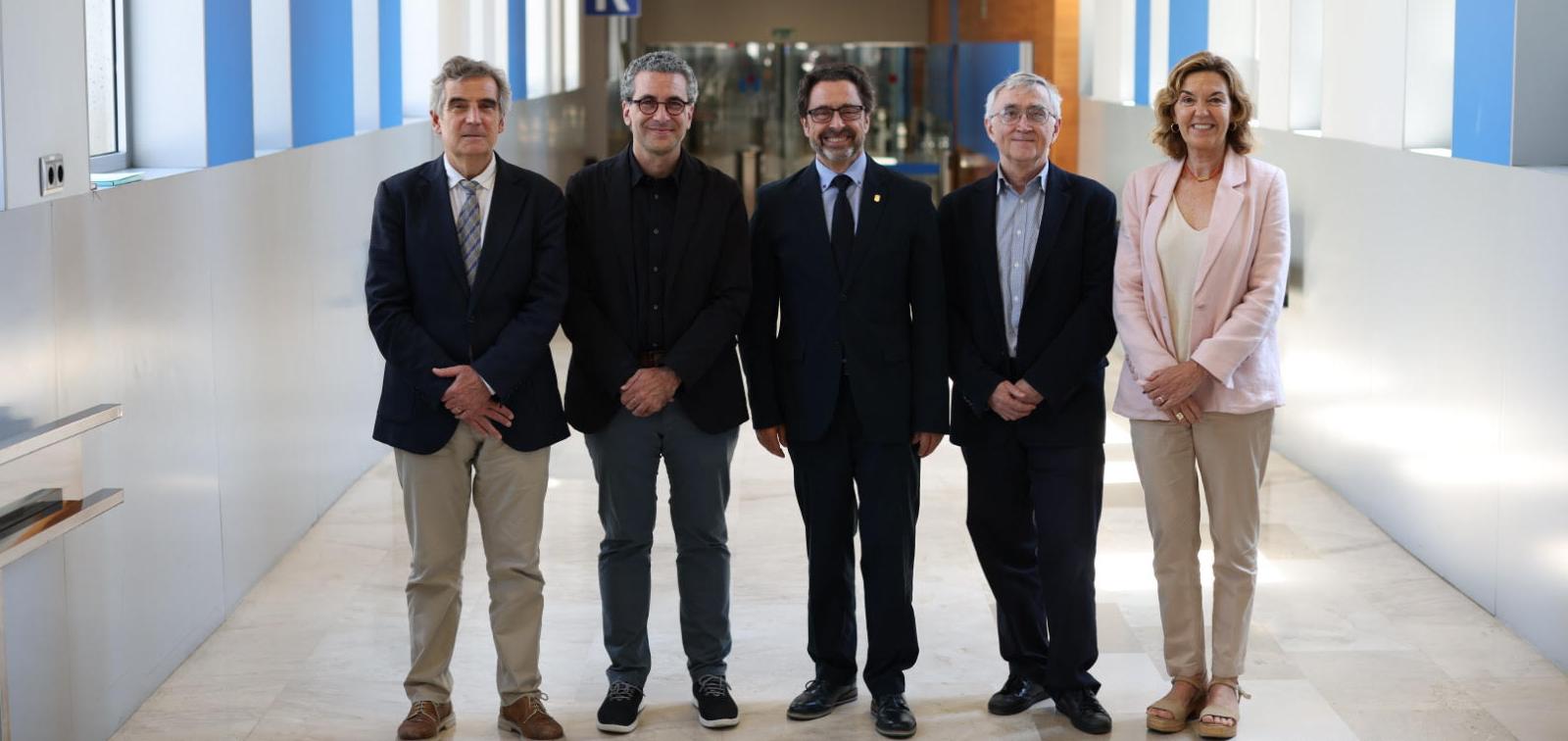ISGlobal and IDIBAPS join the Parc Científic de Barcelona
The move of some teams from these two centres is the first step in setting up the future Campus Clínic of Barcelona on Avinguda Diagonal
11.07.2024
The Parc Científic de Barcelona (PCB) of the University of Barcelona (UB) will host two new research centres with ties to Barcelona's Hospital Clínic: the August Pi i Sunyer Biomedical Research Institute (IDIBAPS) and the Barcelona Institute for Global Health (ISGlobal). The Rector of the UB, Joan Guàrdia; the director of the Parc Científic de Barcelona, Maria Terrades; the director of IDIBAPS, Elías Campo, and the director of lSGlobal, Quique Bassat today signed the contract to formalise the transfer of several units of these two CERCA centres of excellence to the PCB facilities.
IDIBAPS, an institution dedicated to biomedical research of excellence that addresses the most common diseases in our society, will incorporate several research groups in these new facilities, which will occupy an area of 530 square metres. Around 70 people are expected to use this cutting-edge space to advance their translational research.
The new facilities of ISGlobal, a centre supported by the "la Caixa" Foundation, will occupy an area of 400 square metres and will share a floor with the IDIBAPS units. This space will house approximately 60 people from different research groups.
The teams from the two institutions, totalling more than 100 people, are expected to start setting up in early January 2025, once the premises that will house them have been completed.
Reinforcement of the Diagonal Health Axis
The moves are part of the future construction of the new Hospital Clínic on the land occupied by the current Esports UB facilities on Avinguda Diagonal, next to the PCB. This reinforces the Diagonal Health Axis – promoted by the University of Barcelona, with broad institutional support – which aims to consolidate this area of the city as one of the most powerful centres of international reference in health in southern Europe, hosting healthcare, academic, research and business innovation in biomedicine in the same environment.
"The partnership between the University of Barcelona and Hospital Clínic goes back a long way and is solid," explained UB Rector Joan Guàrdia, "and now it has been reaffirmed once again with this important step forward with the transfer of IDIBAPS and ISGlobal. The trifecta of research, business and transfer make the PCB a unique benchmark within the University of Barcelona. The arrival of these research centres at the PCB is a first major step towards the new Clínic project. A project that will consolidate the Diagonal Health Axis as one of the most powerful spaces in the field of health in southern Europe and that will promote the role of the UB as a leading player at the forefront of European science".
According to Maria Terrades, the director of the PCB, "The arrival of these two prestigious and well-established institutions greatly strengthens our centre. We are an infrastructure that hosts 118 entities, where basic research and private enterprise come together, shake hands and work together, and this makes the PCB one of the key players in the national and European health ecosystem".
The director of IDIBAPS, Elias Campo, stated that this represents a unique opportunity for this centre and the research groups that will be installed, as it "responds to the growing need we have for more research laboratory space, given the total saturation of our current locations. In addition, the PCB ecosystem brings clear added value, as it should allow us to engage in broader interdisciplinary collaboration with other institutes, attract and retain scientific talent, and create joint projects to tackle complex scientific problems with a more holistic vision".
"The relocation of our units to the Parc Científic de Barcelona is a unique opportunity for ISGlobal. This new space will allow us to strengthen our research and innovation capabilities in global diseases. Close collaboration with other entities at the PCB will enhance synergies and knowledge sharing, key elements in advancing our mission to improve global health. We are very excited to begin this new phase and to contribute to the development of one of the most important health centres in Southern Europe," concluded Quique Bassat, ISGlobal’s director.



